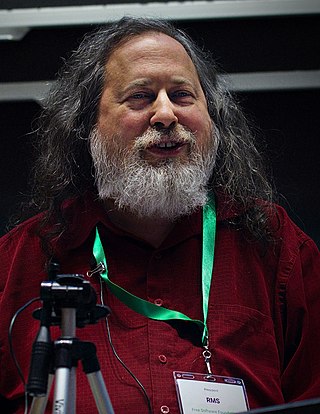Related Research Articles

Bash is a Unix shell and command language written by Brian Fox for the GNU Project as a free software replacement for the Bourne shell. The shell's name is an acronym for Bourne-Again SHell, a pun on the name of the Bourne shell that it replaces and the notion of being "born again". First released in 1989, it has been used as the default login shell for most Linux distributions and it was one of the first programs Linus Torvalds ported to Linux, alongside GCC. It is available on nearly all modern operating systems.

Free software, libre software, or libreware is computer software distributed under terms that allow users to run the software for any purpose as well as to study, change, and distribute it and any adapted versions. Free software is a matter of liberty, not price; all users are legally free to do what they want with their copies of a free software regardless of how much is paid to obtain the program. Computer programs are deemed "free" if they give end-users ultimate control over the software and, subsequently, over their devices.

GNU is an extensive collection of free software, which can be used as an operating system or can be used in parts with other operating systems. The use of the completed GNU tools led to the family of operating systems popularly known as Linux. Most of GNU is licensed under the GNU Project's own General Public License (GPL).
The GNU C Library, commonly known as glibc, is the GNU Project's implementation of the C standard library. It is a wrapper around the system calls of the Linux kernel for application use. Despite its name, it now also directly supports C++. It was started in the 1980s by the Free Software Foundation (FSF) for the GNU operating system.

Within the free software and the open-source software communities there is controversy over whether to refer to computer operating systems that use a combination of GNU software and the Linux kernel as "GNU/Linux" or "Linux" systems.

The Free Software Foundation (FSF) grants two annual awards. Since 1998, FSF has granted the award for Advancement of Free Software and since 2005, also the Free Software Award for Projects of Social Benefit.

Georg C. F. Greve is a software developer, physicist, author and currently co-founder and president at Vereign. He has been working on technology politics since he founded the Free Software Foundation Europe (FSFE) in 2001.

Free and open-source software (FOSS) is software that is available under a license that grants the right to use, modify, and distribute the software, modified or not, to everyone free of charge. The public availability of the source code is, therefore, a necessary but not sufficient condition. FOSS is an inclusive umbrella term for free software and open-source software. FOSS is in contrast to proprietary software, where the software is under restrictive copyright or licensing and the source code is hidden from the users.
IBM Spectrum LSF is a workload management platform, job scheduler, for distributed high performance computing (HPC) by IBM.

Richard Matthew Stallman, also known by his initials, rms, is an American free software movement activist and programmer. He campaigns for software to be distributed in such a manner that its users have the freedom to use, study, distribute, and modify that software. Software that ensures these freedoms is termed free software. Stallman launched the GNU Project, founded the Free Software Foundation (FSF) in October 1985, developed the GNU Compiler Collection and GNU Emacs, and wrote all versions of the GNU General Public License.

Linux is a family of open-source Unix-like operating systems based on the Linux kernel, an operating system kernel first released on September 17, 1991, by Linus Torvalds. Linux is typically packaged as a Linux distribution (distro), which includes the kernel and supporting system software and libraries, many of which are provided by the GNU Project. Many Linux distributions use the word "Linux" in their name, but the Free Software Foundation uses and recommends the name "GNU/Linux" to emphasize the use and importance of GNU software in many distributions, causing some controversy.

gNewSense was a Linux distribution, active from 2006 to 2016. It was based on Debian, and developed with sponsorship from the Free Software Foundation. Its goal was user-friendliness, but with all proprietary and non-free software removed. The Free Software Foundation considered gNewSense to be composed entirely of free software.
Mark Bender Gerstein is an American scientist working in bioinformatics and Data Science. As of 2009, he is co-director of the Yale Computational Biology and Bioinformatics program.
The Database of Macromolecular Motions is a bioinformatics database and software-as-a-service tool that attempts to categorize macromolecular motions, sometimes also known as conformational change. It was originally developed by Mark B. Gerstein, Werner Krebs, and Nat Echols in the Molecular Biophysics & Biochemistry Department at Yale University.

The GNU General Public License is a series of widely used free software licenses, or copyleft, that guarantee end users the four freedoms to run, study, share, and modify the software. The license was the first copyleft for general use, and was originally written by Richard Stallman, the founder of the Free Software Foundation (FSF), for the GNU Project. The license grants the recipients of a computer program the rights of the Free Software Definition. The licenses in the GPL series are all copyleft licenses, which means that any derivative work must be distributed under the same or equivalent license terms. It is more restrictive than the Lesser General Public License, and even further distinct from the more widely-used permissive software licenses BSD, MIT, and Apache.
The Free Software Foundation (FSF) is a 501(c)(3) non-profit organization founded by Richard Stallman on October 4, 1985, to support the free software movement, with the organization's preference for software being distributed under copyleft terms, such as with its own GNU General Public License. The FSF was incorporated in Boston, Massachusetts, United States, where it is also based.

Alexandre "Alex" Oliva, is a Brazilian free software activist, developer, former vice president of the board of directors of the Free Software Foundation (FSF) and founding member of Free Software Foundation Latin America (FSFLA). He is currently on-hold from his PhD studies at the Institute of Computing of the State University of Campinas, Brazil whilst working as a compiler engineer at Red Hat, contributing in the GCC compiler. He is the maintainer of Linux-libre, a fork of the Linux kernel which removes non-free software components, such as binary blobs from the kernel. The Linux-libre kernels are used in Linux distributions such as Parabola GNU/Linux-libre and Trisquel, all of which are recommended by the Free Software Foundation and the GNU Project.

The Slurm Workload Manager, formerly known as Simple Linux Utility for Resource Management (SLURM), or simply Slurm, is a free and open-source job scheduler for Linux and Unix-like kernels, used by many of the world's supercomputers and computer clusters.

Philip Eric Bourne is an Australian bioinformatician, non-fiction writer, and businessman. He is currently Stephenson Chair of Data Science and Director of the School of Data Science and Professor of Biomedical Engineering and was the first associate director for Data Science at the National Institutes of Health, where his projects include managing the Big Data to Knowledge initiative, and formerly Associate Vice Chancellor at UCSD. He has contributed to textbooks and is a strong supporter of open-access literature and software. His diverse interests have spanned structural biology, medical informatics, information technology, structural bioinformatics, scholarly communication and pharmaceutical sciences. His papers are highly cited, and he has an h-index above 50.
OpenLava is a workload job scheduler for a cluster of computers. OpenLava was pirated from an early version of Platform LSF. Its configuration file syntax, application program interface (API), and command-line interface (CLI) have been kept unchanged. Therefore, OpenLava is mostly compatible with Platform LSF.
References
- 1 2 3 4 5 6 7 "Werner Krebs". OrcId. Retrieved 2015-10-30.
- ↑ Krebs, Werner G. (2002). The database of macromolecular motions : a standardized system for analyzing and visualizing macromolecular motions in a database framework (PhD thesis). Yale University. OCLC 54626123.
- ↑ Krebs, Werner G. (1996). Kinetic Analysis and Intermediate Structure Determination from High-Speed Time-Resolved Crystallography (MS thesis). University of Chicago. OCLC 923013077.
- 1 2 "Bourne Laboratory Personnel". SDSC. Retrieved 2015-10-30.
- ↑ "Werner G. Krebs". Mathematics Genealogy Project. Retrieved 2015-11-01.
- 1 2 "Werner G Krebs PhD Speaker Profile". Acculation. Retrieved 2015-10-30.
- 1 2 "Werner Krebs". LinkedIn. Retrieved 2015-10-30.
- ↑ "Werner Krebs". Yaetdo. Retrieved 2015-10-30.
- ↑ "Heckman's Computation Center". University of Chicago. Archived from the original on April 22, 1999. Retrieved 2015-10-30.
- 1 2 "Werner G Krebs PhD Academic Bio" . Retrieved 2015-10-30.
- ↑ "President's Report of the Salzburg Global Seminar" (PDF). salzburgglobal.org. Salzburg Global Seminar. OCLC 6374793 . Retrieved 2015-10-30.
- ↑ "Founder Institute Graduates". fi.co. Founder Institute. Retrieved 2015-10-30.
- 1 2 3 Anonymous (7 May 1999). "Netwatch". Science. 284 (5416): 87. doi:10.1126/science.284.5416.871b. S2CID 220104660.
- 1 2 Bourne, PE; Murray-Rust, J; Lakey JH (Feb 1999). "Protein-nucleic acid interactions Folding and binding Web alert". Current Opinion in Structural Biology. 9 (1): 9–10. doi:10.1016/s0959-440x(99)90000-3.
- ↑ "Career Advice". Orange County Register. 2014-09-30. ISSN 0886-4934 . Retrieved 2015-10-29.
- ↑ "Job Advice". New York Daily News. 2014-10-01. Retrieved 2015-10-29.
- ↑ Bourne PE, Helge W, eds. (2003). Structural Bioinformatics. Hoboken, NJ: Wiley-Liss. p. 229. ISBN 978-0-471-20199-1. OCLC 50199108.
- ↑ Gu, Jenny; Bourne, Philip E. (March 2009). Structural Bioinformatics (2nd ed.). Wiley-Blackwell. ISBN 978-0-470-18105-8.
- 1 2 "Morphs". Proteopeida. Retrieved 2015-10-30.
- ↑ Borner (ed.). Knowledge Management and Visualization Tools in Support of Discovery (NSF Workshop Report) (PDF) (Report). National Science Foundation Workshop. p. 5. Archived from the original (PDF) on 2016-03-04. Retrieved 2015-11-01.
- 1 2 "Press Mentions". Acculation. Retrieved 2015-10-30.
- 1 2 3 "Brave GNU World". Brave GNU World Japan. Brave GNU World. Retrieved 2015-10-30.
- ↑ "Werner G. Krebs's Google Scholar Profile". Google Scholar. Retrieved 2015-10-30.
- ↑ "GNU's Who". FSF GNU Project. Retrieved 2015-10-30.
- ↑ "GNU Queue". Linux Journal. 2000 (79). ISSN 1075-3583. OCLC 30034634 . Retrieved 2015-10-30.>
- ↑ "GNU Queue". FSF GNU Project. Retrieved 2015-10-30.
- ↑ "How does GNU Queue compare to LSF?". Yale University. Retrieved 2015-12-04.
- ↑ "IBM Platform LSF". IBM. Retrieved 2015-12-04.